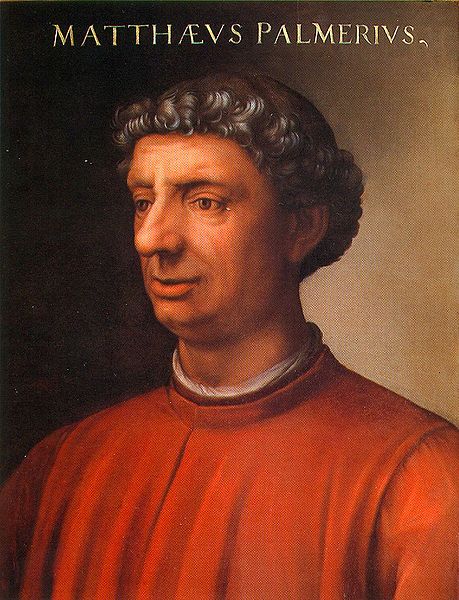<Back to Index>
- Humanist Matteo di Marco Palmieri, 1406
- Caricaturist Paul Gavarni (Sulpice Guillaume Chevalier), 1804
- Marshal of Italy Prince Emanuele Filiberto of Savoy - Aosta, 1869
PAGE SPONSOR

Matteo di Marco Palmieri (1406 – 1475) was a Florentine humanist and historian who is best known for his work Della vita civile ("On Civic Life"; printed 1528) which advocated civic humanism, and his influence in refining the Tuscan vernacular to the same level as Latin. He was sent as Florentine ambassador to the court of Alfonso of Naples. Vespasiano da Bisticci included him among the illustrious men of his generation whose careers deserved an article in his Vite di uomini illustri del secolo XV. vita.
Palmieri was born to a middle class family who held prominent positions in the city. He was educated in Florence and ran a profitable apothecary shop; like his father he pursued a career in civil service, becoming a well known and respected public official between 1432 and 1475 holding many posts and titles.
At the end of his life, he commissioned from the florentine painter Francesco Botticini (1446 – 1498) a monumental Assumption of the Virgin for the church of the Benedictine nunnery of San Pier Maggiore in Florence, where the Palmieri had their chapel; in the painting are the kneeling donor portraits of Matteo and his wife Niccolosa de' Serragli.
Palmieri firmly believed in the humanist ideal that virtù was a combination of both learning and political action, and so in concordance with his political life, he was also an author. He wrote in both Latin and Italian. Among his Latin works are Liber de temporibus (Book of Epochs), a universal chronicle of the world from the time of creation to his present day; the De captivitate liber (The Capture of Pisa), an account of the Florentine capture of Pisa in 1406; and a biography of Niccolò Acciaioli, translated to Italian by Donato Acciaioli.
In Italian Palmieri wrote a three book poem La città di vita ("The City of Life") in 1465, which is an imitation of Dante Alighieri's Divine Comedy. The poem was unpublished in his lifetime, and upon its appearance in print was condemned by the Church as heretical, thus after his death Palmieri's body was removed from the Church of San Pier Maggiore and an effigy of him was burned.
Palmieri's best known work as a humanist is Della vita civile ("On Civic Life"; printed 1528), composed in 1429 and circulated between 1435 - 1440. It is a treaties discussing the qualities of the ideal citizen. It is written as series of dialogs in four books, set in a country house in Mugello during the plague of 1430, with Agnolo Pandolfini a rich florentine merchant as the main speaker. Depending for the first dialogue upon Quintilian's Institutio oratoria and for the last three on Cicero's De officiis, it discusses the physical and intellectual development of children, the moral life of a citizen, the contrasting tensions between what is useful and what is honest. As well as classic writers such as Cicero, Quintilian and Plutarch, it draws on Palmieri's own personal experiences as a civil servant. His primary emphasis and advocacy is on the need for a good education and taking an active part in the life of the city. Education at an early age he considered crucial to improve the human capacity to do good for others and the community.